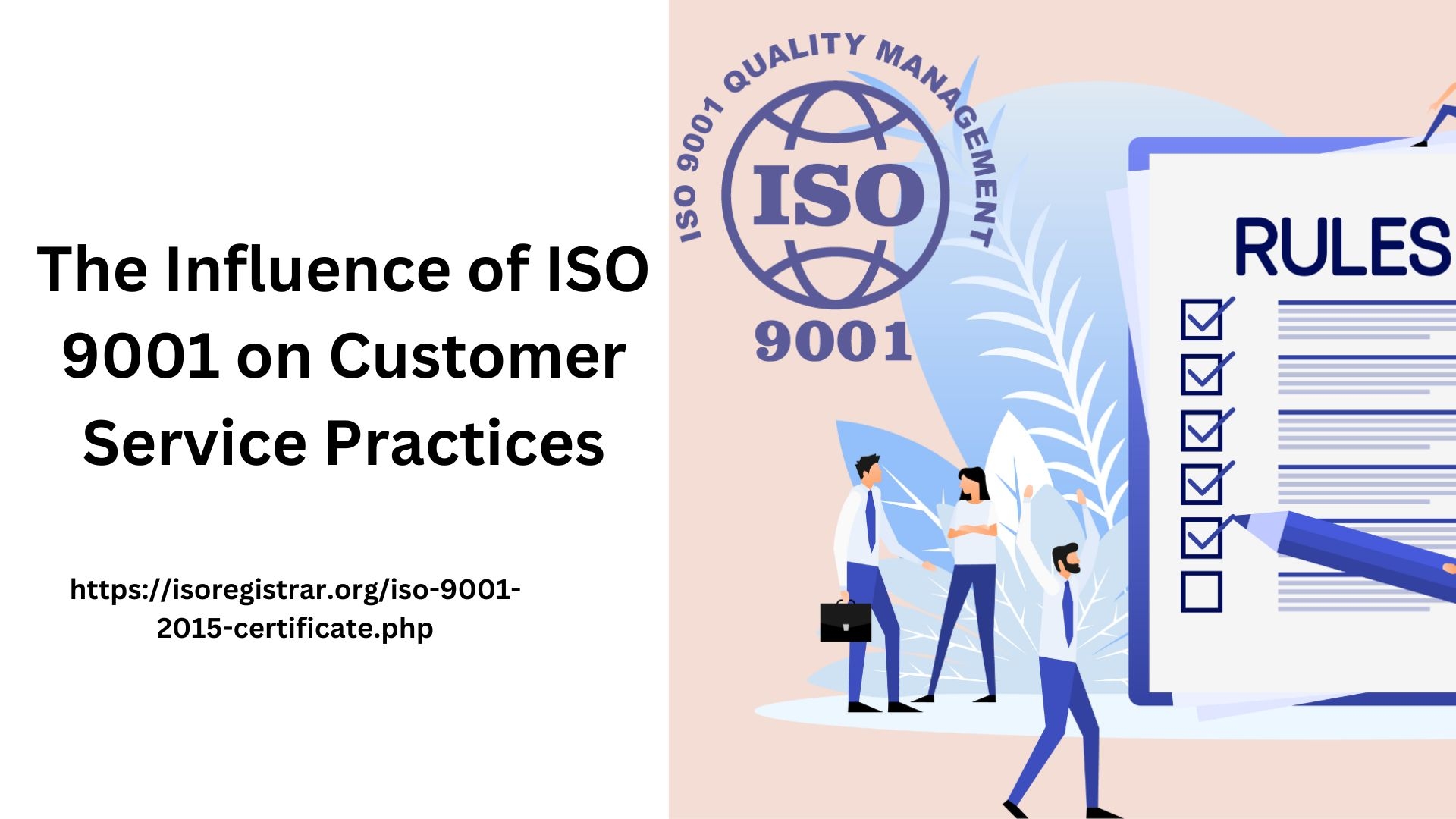The Influence of ISO 9001 on Customer Service Practices

The Influence of ISO 9001 on Customer Service Practices
In an era where customer satisfaction is paramount, organizations are increasingly turning to quality management systems to enhance their service delivery. ISO 9001 certification, the internationally recognized standard for quality management, offers a structured approach that helps organizations consistently meet customer requirements while continuously improving their processes. This article explores how ISO 9001 influences customer service practices, ultimately leading to higher levels of customer satisfaction and loyalty.
Understanding ISO 9001
ISO 9001 provides a framework for organizations to establish, implement, and maintain an effective quality management system (QMS). It emphasizes a process-oriented approach, customer focus, leadership engagement, and a commitment to continuous improvement. Organizations that achieve ISO 9001 certification demonstrate their dedication to quality, making it a powerful tool for enhancing customer service.
The Impact of ISO 9001 on Customer Service
-
Customer-Centric Focus
One of the core principles of ISO 9001 is a strong emphasis on customer focus. Organizations are required to understand customer needs and expectations, which drives them to develop services that align with those needs. This focus encourages organizations to gather customer feedback, conduct surveys, and analyze data to gain insights into customer preferences. By prioritizing customer needs, organizations can tailor their services accordingly, leading to improved customer satisfaction.
-
Standardization of Processes
ISO 9001 promotes the standardization of processes, which is critical for delivering consistent service. When processes are well-defined and documented, employees can follow clear guidelines, reducing variability in service delivery. Standardization helps ensure that every customer interaction meets a specific quality benchmark, enhancing reliability and customer trust. This consistency is especially important in industries such as hospitality, healthcare, and retail, where customer expectations are high.
-
Enhanced Employee Training and Engagement
ISO 9001 emphasizes the importance of employee involvement and training. Organizations must ensure that their staff is adequately trained in quality management principles and customer service practices. By investing in employee training, organizations empower their teams to deliver exceptional service. Well-trained employees are more confident in their roles, leading to better customer interactions. Engaged employees also tend to exhibit a greater commitment to quality, which positively influences customer satisfaction.
-
Effective Communication Channels
ISO 9001 encourages organizations to establish clear communication channels internally and externally. Effective communication is vital for understanding customer needs and addressing any issues promptly. By fostering open lines of communication, organizations can ensure that customer feedback is heard and acted upon. This responsiveness builds trust and demonstrates a commitment to customer service excellence.
-
Continuous Improvement
A fundamental tenet of ISO 9001 is the commitment to continuous improvement. Organizations are encouraged to regularly evaluate their processes and seek ways to enhance service quality. This involves conducting internal audits, analyzing performance data, and implementing corrective actions when needed. By fostering a culture of continuous improvement, organizations can adapt to changing customer expectations and market conditions, ultimately enhancing their service offerings.
-
Measurement and Analysis of Customer Satisfaction
ISO 9001 requires organizations to measure customer satisfaction and analyze the results. This data-driven approach enables organizations to identify trends, assess the effectiveness of their service delivery, and pinpoint areas for improvement. By systematically gathering and analyzing customer feedback, organizations can make informed decisions that lead to enhanced customer service practices.
-
Risk Management
The ISO 9001 standard incorporates a risk-based approach, which helps organizations identify potential risks to service quality. By proactively managing these risks, organizations can prevent service disruptions and ensure a consistent customer experience. For example, identifying and addressing potential staffing shortages can help maintain service levels even during peak demand periods. This proactive mindset enhances customer confidence in the organization’s ability to deliver quality service.
-
Building Long-Term Relationships
ISO 9001 promotes a long-term perspective in business relationships. By focusing on customer satisfaction and quality, organizations can build trust and foster loyalty among their customers. Satisfied customers are more likely to become repeat clients and advocates for the organization, contributing to sustained business growth. This long-term approach is essential in competitive markets where retaining customers is as important as acquiring new ones.
Challenges in Implementing ISO 9001 for Customer Service
While ISO 9001 offers numerous benefits for enhancing customer service practices, organizations may face challenges in its implementation:
-
Resistance to Change: Employees may resist new processes or standards, especially if they perceive them as additional burdens. Effective change management and communication are essential to address this resistance.
-
Resource Allocation: Implementing a QMS requires time, effort, and financial resources. Organizations must be prepared to invest in training, process documentation, and ongoing monitoring.
-
Maintaining Flexibility: While standardization is beneficial, organizations must strike a balance between standardized processes and the flexibility to adapt to unique customer needs. Too rigid an approach can hinder responsiveness.
Note: Apply for iso 14001 certification through the iso portal
Conclusion
ISO 9001 certification significantly influences customer service practices by fostering a culture of quality and continuous improvement. By emphasizing customer focus, standardization, employee engagement, and effective communication, organizations can enhance their service delivery and build lasting customer relationships.
In today’s competitive landscape, where customer satisfaction is a key differentiator, organizations that embrace ISO 9001 are better equipped to meet and exceed customer expectations. As they navigate the complexities of quality management, these organizations can not only improve their customer service practices but also achieve long-term success in their respective industries. Ultimately, the commitment to quality embodied in ISO 9001 serves as a powerful catalyst for enhancing customer satisfaction, loyalty, and business growth.
- Industry
- Art
- Causes
- Crafts
- Dance
- Drinks
- Film
- Fitness
- Food
- Oyunlar
- Gardening
- Health
- Home
- Literature
- Music
- Networking
- Other
- Party
- Religion
- Shopping
- Sports
- Theater
- Wellness
- News


